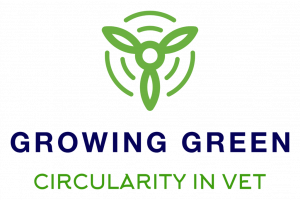Ikasturtea:
2022, 2023, 2024
Ikastetxea:
Growing Green
Rol:
Socio
Kodea:
2021-1-DK01-KA220-VET-000024955
Web orriaren esteka:
https://growing-green.eu/
Background
Over the last years, the European Commission has been promoting awareness-raising about environmental and climate change challenges. In particular the topic of circular economy is part of a broad and articulated international path towards a more sustainable world and has a key role in achieving some of the 17 SDGs of the 2030 Agenda of the United Nations.
According to the key players at the political level, issues affecting our planet need a prompt and effective response. Circular economy is getting more and more relevance among EU strategies and it needs to be tackled not only at economical and environmental level, but with an integrated European action that takes into account several dimensions, including the educational one.In order to spread this important and complex concept among citizens, the whole system of education and training plays a crucial role.
Before starting to write the project proposal, the partnership conducted a feasibility study in order to understand the needs of the target groups as well as their own needs. According to secondary data analysis (strategic documents, global reports) and interviews with VET teachers from different EU countries, the current situation of circular economy and entrepreneurship competences in the VET field has the following challenges:
-Students still have a narrow perception of concepts like circular economy, green capital and green entrepreneurship. Most students still understand entrepreneurship just as the ability to start and run a business. Despite the efforts of the EU and Member States, a broader understanding of these concepts is still missing.
-Whereas climate change and sustainable development are social and economic challenges, which affect all sectors and need to be addressed by different professions, VET schools still lack knowledge and skills to integrate these concepts into their subjects.
-Teaching entrepreneurship in VET schools often depends on the proactivity of individual institutions and teachers. Experiential learning in teaching entrepreneurship is still neglected. Comprehensive and holistic didactic materials for teachers are still rare.
-Structured project-based collaboration between companies and VET education institutions to foster green entrepreneurship competencies of students is still missing or at least it is not so well implemented in the project countries.
-A cross-curricular approach to circular economy and entrepreneurship is still not 100% perceived and implemented in the countries participating in this project. Very often green entrepreneurship is still meant as a separate subject instead of as a transversal competence to be implemented across all disciplines.
As a consequence, partner organisations share the same concerns: VET students seem to have only a very general and abstract idea about circular economy, green capital and entrepreneurship. They do not catch the importance of these concepts and are not able to take concrete actions in order to really play a crucial role in the society by implementing them, meant in terms of being creative, proactive, able to see reality with an open mind and catching potential business opportunities in line with the principles of circular economy and taking into account environmental and climate-change challenges.
Growing Green project puts a special emphasis on linking the concept of circular economy with the need to boost entrepreneurial competences for future European citizens. The starting point is to raise awareness about environmental and climate-change challenges and circular economy topics among VET students, by practically reinforcing at the same time their entrepreneurship competences through workplace learning.
With GROWING GREEN we want to “bring education to life through practical experiential learning models and experience of real-world entrepreneurs” in order to give students hands-on experiences of green entrepreneurship and a clear understanding of what green entrepreneurship means.
Objectives
Growing Green project aims at enhancing awareness raising about circular economy and at developing related green-entrepreneurship competences, in line with the European strategy on these topics.
The general objective of the project is to reinforce green entrepreneurship competences (according to the EntreComp definition of entrepreneurship) among VET students. We will implement an experiential workplace-based model of teaching green entrepreneurship to VET organisations in order to boost quality and frequency of cooperation between VET institutions and local businesses of different sectors.
The specific objectives of the project are the following:
-To introduce a new practical green entrepreneurship model by working on real cases in business and industry;
-To deliver new green-oriented entrepreneurship training materials for teachers and students to support work-based learning about green entrepreneurship;
-To equip VET teachers with skills for mentoring and guiding students towards green entrepreneurship;
-To support cooperation between VET institutions offering courses in different economic sectors and local businesses with the aim of offering more experience for developing green-oriented entrepreneurial competencies of VET students;
-To strengthen cooperation between VET and businesses for creative solutions and product development by joint work between students, teachers and local businesses.
Moreover, by cooperating at the transnational level, the consortium is expected to get the following benefits:
-Access to a bigger set of knowledge and experiences in different countries about circular economy.
-Exchange on methods and contents about the integration of circular economy in the VET curriculum.
-Different expertise and points of view, which will enrich the design and development of materials and project outcomes, also through co-creation of PRs.
-Creation of a network of partners interested in the topics of circular economy and sustainability, which can lead to new potential projects/activities in the future.
-Increased work satisfaction of the staff involved in the project by working with peers and by visiting schools and companies from different countries, which is always an enriching and open mind-experience.
The transnational dimension of the project represents an essential prerequisite for strengthening and promoting among the partners the implementation of this experiential workplace-based model of teaching green entrepreneurship. It is a shared belief of the partners that a common model, coming from cooperation among organisations with different backgrounds, expertise and experiences (VET schools, entrepreneurship providers, organisations expert on circular economy and recognition of skills, companies), will have an additional value in terms of potential and impacts, and can easily be extended to other organisations in other countries. The basic idea is to build a model that, inspired by the European recommendations on circular economy, green capital and entrepreneurship and implemented and tested in different contexts, can be easily used and replicated all around Europe, by raising the awareness about environmental and climate-change challenges and at same time stimulating people in being proactive and undertaking related initiatives.
Activities
Growing Green project, in order to materialise its objectives and achieve planned results, comprises a set of tasks for each project result, an international learning activity, 5 multiplier events, supported by management and monitoring activities and by a well-defined sharing and promotion strategy that will ensure the use of results even after the project has ended.
In particular:
The 1st step of Growing Green project aims at defining the Growing Green Entrepreneur, a manual based on an experiential approach of teaching green entrepreneurship in cooperation with local business. In order to achieve this results, co-creation activities, analysis of existing contents and production of training materials will be implemented by partners.
The 2nd step of the Growing Green project will produce the Growing Green Gamification, which combines gamification with green principles. In order to achieve this result, co-creation activities for project partners will be organized as well as an online conference for the collection of success stories implemented by external VET schools. Finally, associated companies will be called to propose challenges for the game.
Partners will meet in Slovenia in M16 (Growing Green Capacity Building- step n. 3) in order to finalise, experiment and validate The Growing Green Entrepreneur and the Growing Green Gamification previously designed and to envisage the work to start and evaluate the pilot, assess key results and create some tools for the integration of the products created into VET schools offers. This activity will be necessary for partners to implement the pilot in their countries in the most effective way.
The 4th step of the Growing Green project foresees the pilot implementation in the four countries and the collection of all the projects implemented by 160 VET learners with the collaboration of 60 VET teachers, entrepreneurial providers and local companies.
Finally, 4 Growing Green workshops will be organised to promote project results in the different countries in order to guarantee the uptake of the Growing Green materials and methodologies by other VET providers as well as the presentation of projects implemented by VET students in collaboration with teachers, entrepreneurial providers and local companies, with the final aim of guaranteeing sustainability of the project itself.
A final online conference will be organized for all VET students, VET teachers, companies and project partners to share and promote the projects and prototypes realized in the different schools and exchange key findings/success stories/challenges encountered.
Sharing and promotion activities will be fundamental to assure the involvement of target groups and to boost the project impact in the longer period. The partners will implement a multi-media campaign to reach the different target groups.
Management and monitoring activities will be extremely important to assure the smooth implementation of all activities. All face-to-face meetings will involve knowledge sharing activities and exchange of practices, co-creation activities to shape the project results or peer review of project results, review of project milestones, project intangible results and costs, visits to associated partners. Additional online meetings will be organised.
All activities will be implemented in the most sustainable way considering both the environmental and social aspects as part of the Growing Green approach.
Impact
The main expected concrete results of GROWING GREEN project are:
-The Growing Green Entrepreneur: a teachers Manual, a sustainable collection of materials, tools, activities and process roadmap for Growing Green experiential approach.
-The Growing Green Gamification: a practical game built up combining training methodologies with green concepts.
-The Growing Green framework: a set of tools and instruments to evaluate, assess key results of the pilot and integrate the Growing Green approach into the educational offer of VET schools.
-The Growing Green Compendium of prototypes collecting projects and prototypes prepared by VET students participating to the pilot.
Other project tangible results include:
– N° 9 partner organizations actively participating to 10 transnational meetings.
– N° 5 monitoring reports drafted.
– N° 1 learning activity organized, which sees the participation of 17 staff members of the involved organizations.
– at least 10000 stakeholders reached through sharing and promotion activities.
– at least N° 60 VET teachers and N°160 youth participating to the pilot.
– at least N° 120 people participating to the multiplier events on site and at least N° 300 people online.
Project management results:
-Effective project sustainability (social and environmental) efforts achieved: conditions provided through the application of equal opportunities for all, Inclusion and Diversity Plan, projects results adapted to VET learners at risk of exclusion, sustainability principles applied to project meetings and to the C1, etc.
-Successful implementation of the project and impact achieved: conditions provided through the professional cooperation partnership establishment, careful planning, human and financial resources allocation, Project Management Handbook, Quality Management Plan, quality and monitoring sessions, etc.
-Successful project sharing and promotion efforts and solid provision of project sustainability: conditions provided through the Sharing and Promotion Plan, outstanding outreach provided through planned activities and networks available, etc.
-European dimension of project results and cooperation between the organizations involved directly and/or indirectly: due professional cooperation partnership establishment, addressing common hot topics, providing relevant and adequate, etc.
Outcomes for participants in the project activities include:
VET students:
-with a comprehensive knowledge about the concepts of circular economy and green entrepreneurship.
– with improved entrepreneurial mindset and an higher possibility of employability thanks to the relevant skills acquired and the practical experience gained in working with companies.
– with reinforced open up mindset for transnational cooperation and participation to work-based projects.
VET teachers:
– with better capability to work on green oriented entrepreneurship with companies and entrepreneurial providers
with a greater network at international level
– with an increased awareness of green entrepreneurship as a way of working simultaneously on customer, technical and business perspectives.
– Entrepreneurial providers with a better knowledge on circular economy and green-oriented business and a better capability to work with VET teachers and students
Companies with an increased capacity to work internationally and willingness to include green principles in their business
Other outcomes:
– Higher motivation of VET schools reached by sharing and promotion activities for teaching green-oriented entrepreneurship by connecting the world of business to the VET through the project and workplace teaching model.
– Better awareness of experiential implementation of green-oriented entrepreneurship competences among VET schools (students, teachers, other players and staff resources inside the institution), decision makers and PA.
– Application of the new green entrepreneurship model in the countries involved.



